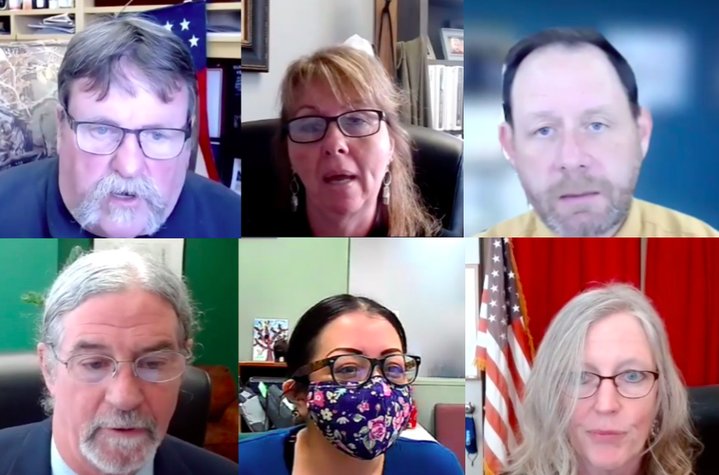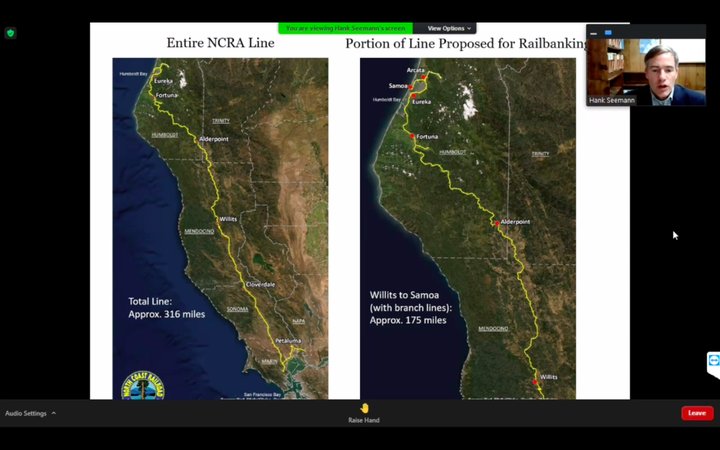
Screenshot from Tuesday’s Board of Supervisors meeting (clockwise from top left): First District Supervisor Rex Bohn, Second District Supervisor Michelle Bushnell, Third District Supervisor Mike Wilson, Fourth District Supervisor Virginia Bass, Auditor-Controller Karen Paz Dominguez and Fifth District Supervisor Steve Madrone.
###
The Humboldt County Board of Supervisors had a relatively short agenda on Tuesday, but they wound up engaged in some lengthy conversations on topics ranging from the county’s finances to its post-pandemic work routines and The Great Redwood Trail. You’ll find our weekly roundup in the paragraphs below.
The bulk of the morning session was occupied by urgent deliberations over the county’s ongoing fiscal management problems, which, over the past two years or so, have been the source of bitter infighting and the subject of countless meetings.
Today, the County Administrative Office was asking the board to approve spending up to $500,000 on a contract extension with Sacramento firm Macias, Gini & O’Connell, LLP (MGO). Back in March the county hired the firm to provide an array of financial management services. The original agreement with the firm was for half that amount, but in its staff report the County Administrative Office said more help is needed.
After consulting with various county departments, the staff report concluded that “the good of the organization would benefit from a contract amendment to extend the term of the agreement to June 30, 2022 and increase the amount by $500,000 in order to increase the scope of services.”
Those expanded services, enumerated in a long, bullet-pointed list, amount to hiring the firm to serve as the county’s chief financial officer (CFO), under the direction of County Administrative Officer Amy Nilsen. MGO would agree to provide improvements to internal controls and efficiency, offer assistance with the county’s new payroll system and give help to various departments, including the Auditor-Controller’s Office, the Treasurer-Tax Collector’s Office.
The item was on the agenda under the consent calendar, meaning it was set to be approved alongside a range of other matters in one cumulative vote, with very little discussion. However, Fifth District Supervisor Steve Madrone pulled the item for a more thorough look, saying it seemed like a lot of money.
After a brief presentation by Nilsen, First District Supervisor Rex Bohn voiced frustration with the ongoing issues, particularly the fact that the Auditor-Controller’s Office has yet to fully close the books on Fiscal Year 2019-20, with the next fiscal year set to begin in just eight weeks.
“I don’t know whose fault this is, but I’ve been getting phone calls from school districts [and] special districts … saying they can’t do their year-end audits because our books aren’t closed,” Bohn said. He referred to an allegation from the county’s Public Works Department, whose director, Tom Mattson, has said his department lost out on roughly $600,000 in state and federal reimbursements last year because the books weren’t closed in time for him to submit claims. “This has got to end somewhere,” Bohn said.
Multiple department heads appeared via Zoom and urged the county to approve the contract with MGO. Human Resources Director Linda Le said the firm’s staff would serve “as a nexus to the Auditor-Controller’s Office to help this organization move forward” in a fiscally responsible way.
Treasurer-Tax Collector John Bartholomew said he has grown concerned about potential blind spots in financial transactions that involve both his office and that of Auditor-Controller Karen Paz Dominguez. “On the Treasury side, [we] feel like we’re operating in the dark,” he said. “I’m not throwing aspersions to the Auditor-Controller’s Office, but we really need to have a comfort level that checks and balances do in fact exist, and that transactions are done in accordance with government code.”
Sheriff Billy Honsal agreed that matters have grown urgent and said that without knowing what his department’s fund balances are, it’s difficult to plan for offering services into the future. “This is something the county needs to put a lot of effort into, to try to fix this issue … because things are not working good right now,” he said. “I think you all need to hear that.”
“It’s very important that we close our books and get our audits done,” Public Works Director Tom Mattson said. “Any resources we can get to solve this problem would be greatly appreciated.”
Planning and Building Director John Ford said he supports the proposal, and he recounted an issue in which a grant given to Open Door Community Health Centers back in 2007 recently got mistaken for a loan due to a bookkeeping mixup. “So any ability to help clarify these things would be extremely helpful,” Ford said.
Connie Beck, director of the county’s Department of Health and Human Services, noted that MGO has been very helpful in getting documents together in a way that allowed the Auditor-Controller’s Office to get her department’s claims approved.
Eventually, Paz Dominguez had a chance to give her take on the situation. Speaking from her county office she said she didn’t know the meeting would include discussions about her office, and while she agreed with the call for transparency she disputed some of the allegations made by department heads. For example, she said the Treasurer-Tax Collector’s Office has been given full access to the Finance Enterprise software used in her own department and thus shouldn’t have concerns about blind spots.
Paz Dominguez also said some county departments have been forgiving loans without proper authority, which has caused confusion about ending account balances, and she insisted that all funds for special districts and schools have already been closed. She also questioned how much access to the county’s fiscal management software she should give to independent special districts.
“I want us all to be on the same page,” Paz Dominguez said. As for hiring MGO, she said that’s the purview of the CAO’s office and its head, Amy Nilsen. “What she intends to have them do I’m not sure,” Paz Dominguez said.
Regarding her own department, Paz Dominguez said that as soon as she’s able to fill the recently approved new positions for accountants and fiscal assistants, things will only get better.
Board Chair Virginia Bass said the conversation had gotten a bit off-topic, but the contentious back-and-forth continued. Bohn said the Fortuna School District and others have yet to receive their apportionments, and, recalling Paz Dominguez’s recent absence from the inaugural Audit Committee meeting, he said she’s clearly too busy to offer training to outside entities.
“I don’t care how we get there,” he said. “How do we get the people their money? … We’re spending so much time on this. We’ve spent more time on the Auditor-Controller’s Office in the last 18 months than I have in my previous seven years here.”
Third District Supervisor Mike Wilson said this proposal to pay for more services from MGO is “not perfect,” but he pointed out that the county may not use the entire half-a-million dollars, and he expressed hope that the funds would be used efficiently. With that, he made a motion to approve the contract agreement.
Fifth District Supervisor Steve Madrone seconded the motion, saying, “I too hope that this large expenditure actually provides assistance to Auditor-Controller’s office and all departments.” He added that he believes every county department shares some degree of blame for these ongoing fiscal issues.
The board wound up approving the $500,000 agreement with MGO unanimously.
###
Later, the board consulted with public health staff regarding California Governor Gavin Newsom’s plan to fully reopen the state’s economy on June 15, as long as there’s sufficient vaccine supply and hospitalization rates remain stable and low.
Humboldt County Health Officer Dr. Ian Hoffman said a number of key regulatory decisions have yet to be made, so it’s hard to say what Board of Supervisors meetings and other county business might look like come summer.
The board members offered differing viewpoints about how to return to in-person meetings, if at all. Madrone said that as long as there’s COVID circulating in the community, he has no intention of returning to congregate settings such as public meetings, “even though I’ve been vaccinated.”
He also suggested that shaking hands might be ill-advised, from a public health standpoint, saying “Oriental families” have a better approach with clasping their hands and bowing. (A quick aside on that: The term “Oriental” is widely considered an outdated and offensive means of referring to human beings. Five years ago, former President Barack Obama banned its usage — along with “negro” — in federal laws.)
Second District Supervisor Michelle Bushnell questioned Madrone’s stance on public gatherings, saying we’re not likely to see COVID disappear anytime soon. Hoffman agreed with that assessment, saying, “I think COVID is here to stay. It will become endemic.” He also vouched for the efficacy of vaccines in preventing serious illness and hospitalizations, even in the rare cases when someone who’s gotten their shots contracts the virus.
Eventually, the supervisors directed staff to develop recommendations for a permanent tele-work policy. They also approved the state’s supplemental paid sick leave and directed Human Resources to establish a new bank of leave hours for each county employee. After June 15, the board will consider whether to direct employees to return to in-person work activities, and whether to return to in-person board meetings themselves.
###

Humboldt County Deputy Director of Environmental Services Hank Seemann delivers a presentation on the NCRA and the proposed Great Redwood Trail. | Screenshot.
###
Toward the end of the public session Tuesday, the board considered whether to send a letter of support for the North Coast Railroad Authority’s proposal to railbank the northern section of its right-of-way.
Hank Seemann, the county’s deputy director of environmental services, explained that this would preserve the public resource for possible future rail use while allowing development of The Great Redwood Trail, an ambitious and expensive project that, if completed, would result in a multi-use pathway stretching 316 miles from San Francisco Bay to Humboldt Bay.
Seemann said this proposal would facilitate more near-term development of trails between cities along the coast, including the completion of the Humboldt Bay Trail South, from Eureka to Bracut. Developing the trail through the rural, interior regions would be a longer-term process, he added.
Bohn questioned whether the Timber Heritage Association, a volunteer group with dreams of an excursion train around the bay, had been adequately consulted.
Bushnell said landowners in her district had reached out to her with concerns about the impact of the proposed trail on their properties and cattle. She said there hasn’t been enough public outreach, and Bohn agreed.
Seemann said that sending the letter would allow the county to express its concerns, including concerns about engaging rural landowners, and said that in the absence of railbanking, portions of the right-of-way could revert to private ownership, which would break up the corridor.
Wilson said that while the railbanking proposal may have flaws, it’s “unequivocally” better than the alternative because it would preserve the corridor for future use. Madrone agreed.
The public comment period saw people from both sides of this debate speak up, with some saying there hasn’t been enough analysis and consultation with landowners while others lauded the proposal as a means of connecting communities and cleaning up the mess left in the Eel River Canyon by private rail operators.
Bass proved to be the swing voter, as she often is, and though she expressed some reservations she said, “I think sending the letter may be some of the best ways to get our concerns on the record. … I’m really not thrilled with this but I will likely support the recommendation.”
Indeed she did, and with Wilson and Madrone joining her, the board narrowly approved sending the letter with a 3-2 vote. You can read the full letter by clicking this link.
CLICK TO MANAGE